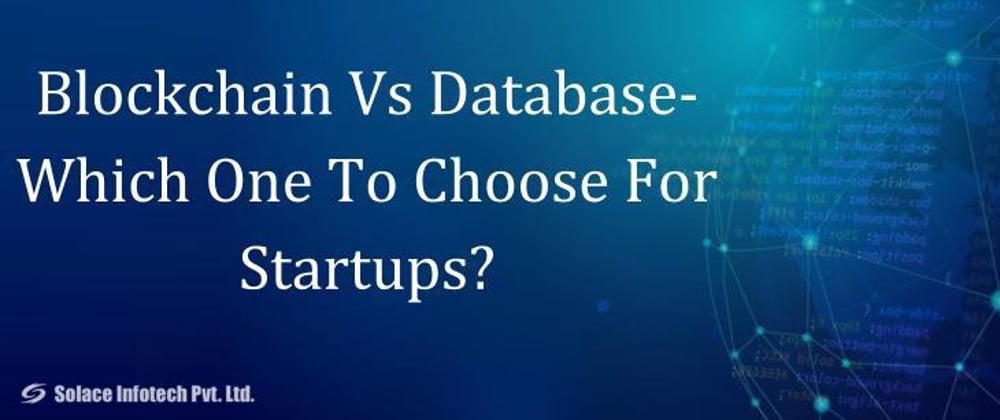You might be using a traditional database for many years and have hands on it. But these days blockchain technology is gaining popularity because of the security it provides. If you are running a startup and confused about choosing the best between blockchain and traditional database, then you are not alone as there is a clear confusion when it comes to comparing these both technologies. For beginners, both might sound similar. But, it is not true when many people consider blockchain as just another database.
In fact, blockchain is more than just a database. Here we will compare blockchain vs database. Before proceeding for comparison, let’s see each one in detail.
What Is Blockchain?
Blockchain is better defined as a distributed ledger technology(DLT). It enables a set of peers to work together to create a unified and decentralized network. It uses consensus algorithm through which peers can communicate and also share information or data. There is no need for a central authority and this makes the whole network trustworthy as compared to other networks.
Also, there is no need for a centralized authority which makes the whole network trustworthy when compared to other networks. The terminologies used are proof of work and time-stamping. The system is secure, transparent and immutable. When one peer send information to another, transaction is generated. After generation of transactions, it needs to be validated using consensus algorithms. Here proof of work is used to validate the work, which ensures that only valid transactions are passed into the blockchain. Blockchain is all about the blocks and are used to store transactions and data which is required to operate blockchain successfully.
What Is Database?
Database is a centralized data structure having the ability to read, write, and run by an administrator. It can store multiple copies of same data and its history. Users having appropriate access can execute read and write actions. Centralization is the main property of databases due to which centralization is easy and fast access. It brings many benefits to the database. Storing and accessing data is easy and rapid. But there are some drawbacks and the significant one is the chance of data getting corrupted.
The admin has all rights. Data structure is used by database to store the information. The stored data can be queried using Structured Query Language (SQL). Data elements are stored in the form of tables. Relational database allow to work with multiple databases simultaneously.
You can also know details of blockchain at- Blockchain – The Basics you should know
Blockchain Vs Database-
1. Architecture-
Blockchain uses distributed ledger architecture. It is a peer-to-peer enabled network in which each peer connects with another using secure cryptographic protocols. As there are no centralized node, they take part in a consensus algorithm. The various available algorithms are proof of stake, proof of work, proof of provenance and so on. Proof of work is the popular algorithm required to solve complex mathematical equations to validate transactions over the network.
Database is based on client/server architecture that can work in small scale and large scale environments. The server is a centralized processing unit and the client receives information from it. Client server communication is maintained through a secure connection. As database is based on centralized approach, it doesn’t need a consensus as a blockchain. Administrators can control all the aspects of the database and all activities are carried out according to the given permissions.
2. Authority-
Blockchain works in a decentralized manner and it brings many implementation and process changes. Networks are allowed to work independently, without need of any centralized control. Decentralizations bring a lot of implementation changes to the current systems and processes that are used by industries. It allows networks to independently work and remove the need for centralized control.
Whereas database works on centralized approach. The administrator has all the authority to manage, create, modify, delete and control the records in the database. Without an administrator, the database will not function at all. He is at the top of hierarchy and can perform tasks like performance optimization. Also he can change the performance optimization of system and delegate authority to others according to their roles in system management.
3. Data handling And Immutability-
Both blockchain and database work differently for data storage and handling.
Blockchain supports immutability means the data that is written cannot be erased or replaced. Immutability means no data altering is possible within the network.
Blockchain supports two operations, Read and write-
Write Operations- write operation is used to add data and information to the blockchain network
Read Operation- read operation is used to read or retrieve data from the blockchain network
In a traditional database, data can be stored and retrieved easily. CRUD is used to carry out proper operation of the application where CRUD stands for Create, read, Update and Delete. This means that data can be replaced ad erased with new values. Traditional databases don’t exhibit immutability and thus are more inclined to being controlled by a rogue administrator.
4. Speed And Performance-
When a transaction is carried out in a blockchain, it is similar to a database. But is slower due to signature verification, consensus mechanism and redundancy. Signature verification is carried out using cryptographic algorithms. And this is a complex process, hence requires time to process. The blockchain is decentralized and it relies on the consensus mechanism. It requires more time before a transaction can be processed.
Databases are known for blockchain and can handle millions of data at the same time. As it works on a centralized approach, it doesn’t need to go through a signature verification process that makes it faster. Each transaction is automatically verified by the database and can be executed rapidly using a queue.
5. Cost And Resources-
Blockchain is a new technology as compared to traditional database and is still progressing hence businesses requires proper planning and execution to integrate it. As blockchain requires end-to-end implementation and cannot be easily integrated into an existing system as an add-on. Blockchain might provide a cost-effective solution because peers manage the network. Organizations don’t require extra cost.
Traditional database is less costly when compared to the blockchain. It is easy to set up and scale and can work with most of the existing processes. Hence most of the businesses who want a rapid and cost-effective system opt for traditional databases. Businesses do not need to manage extra cost for network handling and hence it saves cost.
When To Choose Blockchain?
- Monetary transactions
- Transfer of value
- Verification of trusted data (identity, reputation, credibility, integrity, etc.)
- Public Key Verification
- Decentralized applications (DApps)
- Voting systems
When To Choose A Database?
- Data that need continuous updating, like monitoring and sensors
- Confidential information (non-transparent to the public)
- Data that does not require verification
- Fast Online transaction processing
- Financial data from markets that require fast processing
- Standalone applications that store data
Which One To Choose?
Here you’ve seen the comparison of Blockchain vs Database with different parameters. Blockchain has an advantage of verification methods but it slows the verification process. Means you have to avoid blockchain where fast execution is necessary. It is beneficial for trust, transparency and verification.
You can prefer databases where critical business processes need to be supported and scaled at the same time. Databases are a better choice for general purpose applications. It is high in performance and scalability.
If you are still confused about choosing the best between blockchain and database, consult with solace experts. We have dedicated experts to help you through consultation and development. You can hire blockchain developers of solace team for effective development. Connect with solace and get a free quote for blockchain development. We will be happy to help you.







Top comments (0)